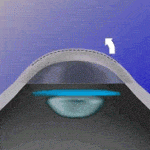The three most common types of refractive errors are nearsightedness, farsightedness, and astigmatism. Those who wear glasses or contact lenses usually have at least one of these conditions. In this blog, renowned ophthalmologist Dr. Brian Boxer Wachler explains the differences between these refractive errors. Read more
Category: Nearsightedness
Top 4 Questions Before Fortified LASIK
If you are getting ready for LASIK in Los Angeles or considering your options, you probably have many questions you need answered. There are several myths and misconceptions about the LASIK procedure and it is often hard to decide whether or not this procedure is right for you. The following questions and answers below may help you prepare.
Top 4 questions to ask before LASIK Surgery:
When you are interested in or preparing for LASIK surgery you probably have questions regarding procedure, recovery, or even how it feels during surgery. Below are the top 4 questions you might ask your eye care specialist before your surgery.
How long will the procedure take?
The procedure itself takes only around 15 minutes per eye. The overall amount of time you will spend in the office will most likely be around 4 hours for completing paperwork, signing consent forms, repeating any testing, and postop observation.
How long is the recovery process?
Around 24 hours after your procedure you will be able to continue your daily activities. Your doctor will likely to want to see you 24-48 hours after the procedure for follow up exam. After a week or two you should fully recover from your procedure. Most of these protocols are for your safety, and each patient is different so you will need to pay attention to the specific details provided to you.
What are some side effects of LASIK?
There are a few possible side effects from the procedure such as dry eyes, glare & halos, and some partial loss of vision which is very rare. If you think you are having any side effects it is important to see your eye care professional right away.
What are some of the benefits of getting the LASIK procedure?
There are many benefits of LASIK – the major one being freedom from glasses or contact lenses. Additional benefits of LASIK procedures are little pain during the procedure, ability to be performed in combination with other treatments, and has a quicker recovery time.
Priscilla grew tired of her itchy eyes and contact lenses ripping, so she couldn’t be happier with her LASIK experience. Watch her story:
LASIK Eye Surgery, Improving Vision
Fortified LASIK Eye Surgery

If you are looking to be lessen the burden of eye glasses or contact lenses there are several options to help you. In the past most people with vision issues had to rely on glasses or contact lenses to get the vision they desired, however there have been many changes and improvements when it comes to vision correction.
While recent treatments including traditional LASIK procedures, not all people are good candidates and it often causes disturbances in the patient’s vision after the procedure is performed. Luckily now there are new alternatives. One procedure, known as Fortified LASIK, is an advanced form of the traditional LASIK procedure which also includes an accelerated version of Dr. Brian’s patented Holcomb C3-R corneal crosslinking. This treatment helps to strengthen the cornea and helps to extend the longevity of the LASIK procedure results
Below you will find more information regarding the Fortified LASIK procedure and you can make the choice for yourself.
Fortified LASIK Eye Surgery:
Fortified LASIK accommodates those that have somewhat thinner cornea or slight irregular shape, because it strengthens the cornea right after the procedure.
Fortified LASIK is only available at the Boxer Wachler Vision Institute. Dr. Brian developed this procedure to increasing the longevity and safety of the LASIK.
May people searching our LASIK in Los Angeles have found Dr. Brian’s procedure to be comfortable and effective in providing visual freedom.
Below are some of the benefits of Fortified LASIK Eye Surgery:
- Can improve overall quality of vision
- Can improve night vision
- Can achieve 20/20 vision (in some cases)
- Quick recovery
- Repairs some cornea distortions
- Can replace or reduce the need for your glasses or contact lenses
- Strengthens the cornea and reduces risk of developing Ectasia
Clear and precise quality of vision is important in our everyday lives, for both work and personal reasons. Ask a friendly patient concierge about the Fortified LASIK procedure. For more information regarding Fortified LASIK.
Watch this clip from the Emmy award daytime talk show The Doctors:
Top Procedures for Vision Correction
There are several new treatment options that can assist with your vision. In many cases these procedures can reduce the need for glasses/contact lenses.
Over the past two decades several new procedures have been developed that are making changes in the lives of many who suffer with vision issues.
For those who are suffering with Astigmatism, Farsightedness, Nearsightedness, Dry Eye, or even Keratoconus there is hope for your vision. Minimally-invasive procedures like LASIK, PRK and ICL can help your vision drastically,
Below you will see some procedures that can assist you in finding visual freedom:
LASIK – The most well-known vision correction procedure. LASIK uses a laser to carefully shave away cornea tissue to create a smooth surface, and therefore correct the vision.
PRK – The procedure involves gently moving the surface skin of the cornea and applying a laser to reshape the outer cornea. PRK was the first type of laser eye surgery for vision correction. PRK preceded development of LASIK.
ICL – ICL is a small implanted lens that can reduce or eliminate your need for contacts or glasses. The goal of ICL is to reduce overall prescription. A patient can consider the ICL procedure if they have a high prescription, and may have conditions such as thin corneas which make them not candidates for other procedures.
For more information on vision correction, click the link below to watch a special episode of The Doctors.
Why am I Not a Good Candidate for LASIK?
Often glasses and contact lenses can be a burden and those who have relied on them for years grow tired of the constant maintenance and careful planning it takes to deal with them on a daily basis. They are looking for alternatives.
For many individuals seeking a vision correction procedure, LASIK immediately comes to mind as it is the most widely-known procedure. Although it is the most known procedure, it is important to have a thorough assessment to find the right vision correction treatment for you. LASIK has promised millions over the years that vision correction can indeed change the need for glasses or contact lenses. However over 20% of those who obtain the LASIK procedure are not good candidates. Getting the LASIK procedure if you are not a good candidate can cause several side effects or complications after the procedure which often need to be corrected such as halos, double vision, and floaters in your line of sight. How do you know you’re not a good candidate?
There are many different reasons for different patients; however universally these are two most common disqualifiers:
• Thin cornea
• Large pupil diameter
There are many alternative procedures that can be safely performed on those with thinner corneas and larger pupils which can achieve the same degree of correction. One of the procedures is PRK, which uses a special computer to help guide the laser during the procedure. This allows for closer and more accurate measurements during your procedure.
When seeking a surgeon for your LASIK surgery in Los Angeles, find a surgeon who evaluates you personally
Watch Gino’s explain his experience with PRK:
True Testimonials: Exploring PRK
Exploring PRK for Vision Correction
For many of us the burden of glasses or contact lenses has been one we could do without for years. But there hasn’t always been a procedure that could relieve us from the burden of wearing glasses or contact lenses. One of the first vision correction procedures developed was PRK, or Photo Refractive Keratectomy.
What is PRK?
PRK uses an excimer laser to reshape the cornea and provides the patient with improved vision. Those who are not good candidates for LASIK, like with thin corneas or large pupils can make good candidates for PRK.
While PRK takes a little longer for recovery it works roughly the same as LASIK. This procedure has little side effects and can show results the minute you get off the table.
What is the PRK Procedure Like?
PRK helps to treat Myopia (Nearsightedness), Hyperopia (Farsightedness), and Astigmatism. It is a vision correction treatment that uses a special laser to reshape the cornea of the eye. For patients who are not a good fit for LASIK, PRK gives them an alternative. However PRK was available before the LASIK procedure.
The procedure generally takes around 15 minutes per eye and allows the patient to see clearer almost immediately.
Meeting Jessica:
Jessica works for Boxer Wachler Vision Institute as the front office administrative assistant.
Jessica is a fun-loving, free spirit that got weighed down by the burden of glasses at age 10 and then with the hassles of contacts at 12.
After having to deal with imperfect vision for half her life and seeing on a daily basis how vision correction has worked for so many she decided to try it for herself.
Jessica was told that she was not a good candidate for LASIK because of her thin corneas but that PRK would still be able to help her. Jessica received her PRK at the very office she worked, at the Boxer Wachler Vision Institute. She stated “Knowing I was in really good hands was all I needed to remain calm and relaxed”.
Jessica now has 20/20 vision and wouldn’t change getting the surgery for the world. She no longer relies on glasses or contacts to experience the world around her. All she experienced during the healing process was a slight fluctuation in her sight for about three weeks and some light sensitivity.
PRK Pros & Cons:
Pros
• Good for patients with thin corneas
• Good for patients with large pupils
• Little to no pain or discomfort
• First vision correction procedure with lasers
• Procedure takes only about 15 minutes per eye
Cons:
• A little longer recovery time (2 days to 2 weeks)
• Risks of Infection or haziness over the eyes
You can watch Jessica’s journey here:



